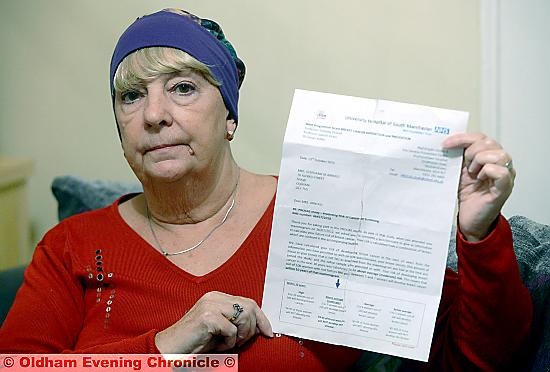Too late
Date published: 12 November 2015

TOO late to make an impact... Stephanie Arnold received the results of a breast cancer risk study three years later, after she had already been diagnosed with the disease.
A woman battling breast cancer says she is outraged after waiting over three years for the results of a study highlighting that she was at risk of developing the disease.
Stephanie Arnold, from Shaw, found a lump in her breast and underwent several tissue tests before she was diagnosed with breast cancer in June.
The 63-year-old underwent full mastectomy in August and was told she would need 18 gruelling weeks of chemotherapy to beat the disease.
However just last month and while undergoing her treatment, she was heartbroken to receive a letter from a PROCAS (Predicting Risk of Cancer at Screening) study, which she took part in in July, 2012, stating that she was “above average (moderate)” risk of developing the disease.
Stephanie, a mother-of-one, said: “I was appalled when I received the letter.
“It had been so long since I took part in the survey that I had forgotten all about it.
“I don’t understand why it took over three years for them to write back to me and tell me that I was at risk.”
She added that she took part in the survey, run at the Nightingale Centre & Genesis Prevention Centre at Wythenshawe Hospital, during a routine mammogram and completed tests and a questionnaire designed to improve how risk of developing breast cancer was calculated.
While those who were classed as being at the highest risk were told quickly about the outcome of the study, others such as Stephanie, were left unaware until the letter arrived recently.
For Stephanie the letter, which included advice about how exercise and diet can reduce their breast cancer risk, had arrived too late.
She said “It also asks women to contact their GP and see if they could benefit from a drug, such as tamoxifen or raloxifene, which can reduce their risk of developing the drug.
“I already know that due to the type of cancer I have, which feeds of the oestrogen hormone, I would have benefited from taking the drug as it stops oestrogen-fuelled cancers growing.
“Even if i’d been told a year ago that I was at risk, it could have made a difference.
“But it was too late for me.
“Instead the NHS is paying for costly treatment, chemotherapy and consultants, all of which could possibly have been avoided.”
She added that she called the contact number on the letter to ask for more information and question why it had taken so long to respond with the results, but did not receive a satisfactory response.
Stephanie, who works in bookkeeping and accounts, said: “If you take part in a survey to find out your risk of breast cancer, you expect to receive the results.
“I understand that they had a lot of results to go through as part of the survey but surely anyone who was above average risk should have been told.”
Stephanie is now sharing her experience to warn others and to encourage women not to be complacent when it comes to breast cancer.
She said: “I was so upset that I ripped the letter up.
“But then I thought that there might be other women out there who don’t realise that they are at risk.
“I’ve always been vigilant and gone for my routine mammograms as my sister died from breast cancer when she was just 34.
“Women may have taken part in the survey and, because they heard nothing, think that they’re fine.
“I should recover from this, but others may not be so lucky.”
APOLOGY
A spokesperson for University Hospital of South Manchester NHS Foundation Trust, said: "We apologise sincerely that this feedback letter was received at such an incredibly distressing time for her.
"When sending out the PROCAS risk letters, rigorous checks against breast cancers are carried out before the letters are sent.
"This is to try and limit circumstances by which people who have taken part in the study are sent feedback letters following a diagnosis of cancer.
"The research team is not automatically notified when a person in the study has received a diagnosis of cancer from another hospital.
"The Predicting Risk of Cancer at Screening (PROCAS) study is research and not a clinical intervention.
"Nearly 58,000 women attending the Greater Manchester Breast Screening Programme between October 2009 and April 2015 agreed to take part in the PROCAS study.
"Participants were given the option of receiving information about their personal risk of breast cancer and were fully informed on the Patient Information Sheet, ahead of consenting to take part, that if they chose to receive their risk they would be contacted towards the end of the study in 2014/2015."
They added that for future research the Trust are hoping to implement an automated risk feedback process in our research projects which will see women receiving their breast cancer risk in a timelier manner soon after mammography, as needed for clinical practice.
Most Viewed News Stories
- 1Police issue appeal following fatal collision on Asda car park in Shaw
- 2Two arrested following early morning raids in Royton
- 3Plans proposed to turn former Clough Manor hotel into 'multi-service hub'
- 4FCHO condemns vandals who broke into Holts Community Centre and set fire to an outbuilding
- 5Mayor's charity contribution for poorly Oldham children




